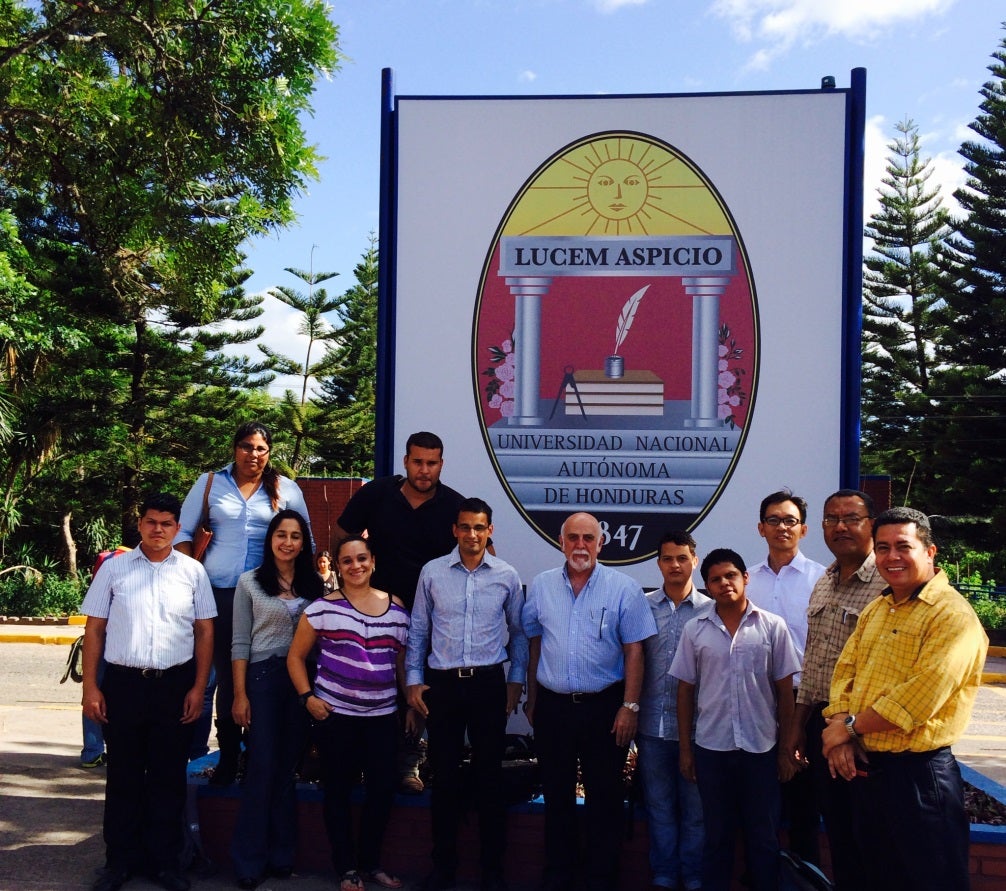Español | English
One of our goals at the Emerging and Sustainable Cities Initiative is to help emerging cities in Latin America and the Caribbean maintain a relatively small carbon footprint despite the considerable growth they will experience in the decades to come. As it is difficult to manage what you don’t measure, we provide our partner cities with greenhouse gas mitigation assessments that determine the emissions of key sectors and offer guidance on how to reduce them.
In order to develop such an assessment for Tegucigalpa, we partnered up with the National Autonomous University of Honduras and the World Resources Institute (WRI), supported with funding from the Nordic Development Fund. A couple of weeks ago, we held a first workshop on carbon emission accounting for the project team from the university’s Science Faculty.
 The workshop participants and organizers in Tegucigalpa, Honduras. Photo: National Autonomous University of Honduras.
The workshop participants and organizers in Tegucigalpa, Honduras. Photo: National Autonomous University of Honduras.
Working with the university has various advantages. The quality of the study will benefit from the team’s technical expertise (one of our team members even contributed to Honduras’ national inventory) and its strong connections to local counterparts who hold much of the data that will be needed. Developing the study locally will also help to adapt it to the city’s needs and build local capacity. All of this makes it more likely that its recommendations will be picked up by Tegucigalpa’s policy-makers.
The students and professors of the project team, led by Dean Nabil Kawas and Professor Lidia Torres, are the ones who are going to do the heavy lifting in developing the assessment—so we want to make sure they receive the training and tools they need to produce solid results. We therefore invited Fong Wee Kean, a leading expert on urban greenhouse gas accounting from WRI, to facilitate the workshop with us and to walk us through the details of the new version of the Global Protocol for Community-scale Greenhouse Gas Emission Inventories (GPC). Fong is one of the lead authors of the GPC, so having him on board allows us to provide our project team in Tegucigalpa with first-hand advice on how to master the many challenges of compiling the inventory, especially limited data availability. At the same time, the sessions give him an opportunity to test the new training methodology that was developed as part of the GPC update.
The GPC is a comprehensive methodology for assessing the carbon footprint of cities. It was developed by the World Resources WRI, ICLEI, and the C40 Cities Climate Leadership Group in cooperation with many other organizations working on urban climate change mitigation. We have been using the protocol for all of our ESCI city inventories since launching the initiative in 2011, thus providing local actors with access to global best practices. Additionally, by tapping into our experience of the last three years, we support the developers in improving the methodology.
More training opportunities for the project team will follow, both in Tegucigalpa and virtually. Our recent workshop focused on taking stock of current emissions, but soon we will take the next steps by projecting the city’s future carbon footprint and identifying measures to support low-carbon development. Once the study has been finalized, probably in early 2015, we will publish it on our Urban Dashboard where similar assessments for other ESCI cities are already available.
The greenhouse gas mitigation study will be an important input for Tegucigalpa’s ESCI Action Plan, which we will develop with the city according to our recently revised Methodological Guide. We hope that it will also be a useful tool to support other planning processes in Tegucigalpa.


Leave a Reply